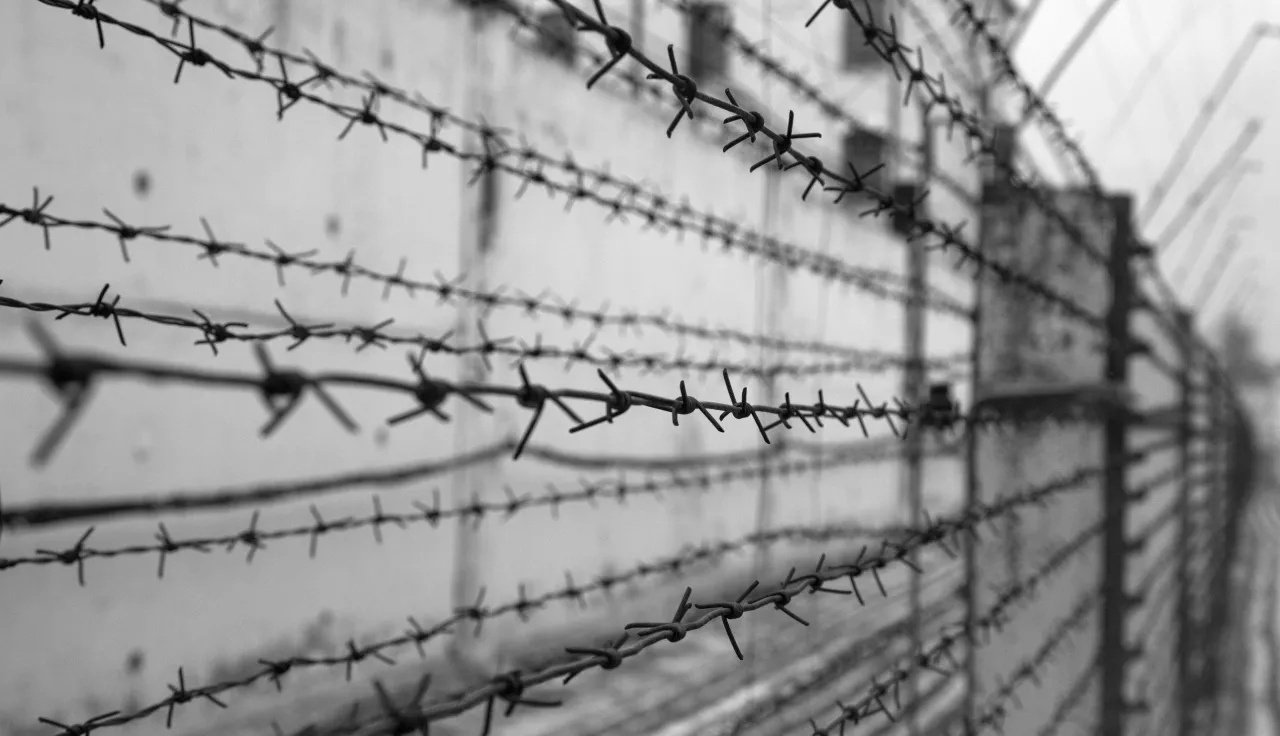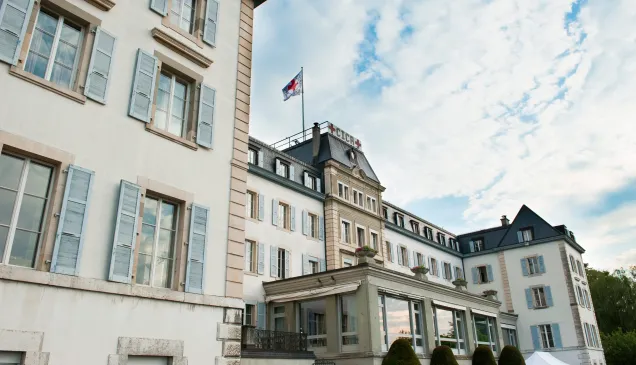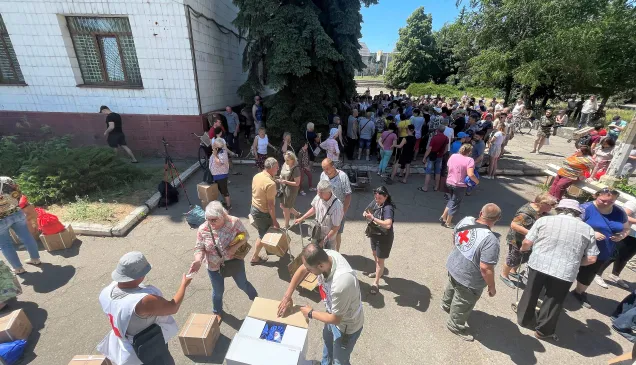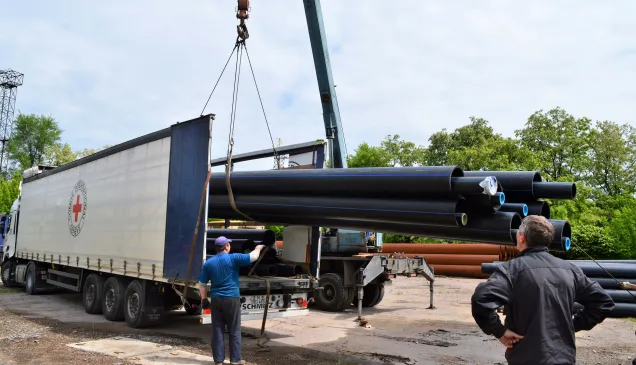Olenivka penal facility: Prisoners of war and ICRC's role

The reports from Olenivka are devastating. Our thoughts are with the families in their pain and heartbreak that someone they love could have been killed in this horrific and unacceptable attack. The ICRC strongly condemns this, and all attacks, on prisoners of war (POWs) and other protected people.
We have received many questions about the ICRC's role in the international armed conflict between Russia and Ukraine, our work in helping POWs and what the Geneva Conventions say about their rights. Here are some answers to those questions. Latest update 26 July 2023.
What has the ICRC been doing since the Olenivka attack? Have you been to the site? Have you visited the POWs injured or killed?
We learned about the alleged attack on Friday 29th July, at which point we immediately requested access to the Olenivka penal facility and to all places where victims are being treated or where the bodies may have been transferred, as well as to facilities where other PoWs might have been moved to. We also offered to support the evacuation of the wounded and to donate medical supplies, protective equipment, and forensic material.
As of yet, we have not been granted access to the PoWs affected by the attack nor do we have security guarantees to carry out this visit. Our offer to donate supplies remains unanswered.
We will keep requesting access to POWs who are or were held in Olenivka, and any other sites where PoWs are held, guided by our humanitarian commitment and our mandate under the Geneva Conventions.
If allowed to visit the scene, is the ICRC prepared and ready to go? What would you do there?
We are ready to deploy to Olenivka. We already have teams with medical and forensic expertise working in the vicinity since we have been present in Donetsk since 2014. We need immediate access to the PoWs who are or were held at the Olenivka facility, wherever they may be, and the necessary security guarantees by parties to the armed conflict for our teams to access the site(s).
In addition to helping with the wounded and the dead, the ICRC would also meet with POWs, to register them and discuss with them in private the conditions of their internment and the treatment they receive – states have a legal obligation to allow us to have such meetings with PoWs under international humanitarian law (IHL) and the Third Geneva Convention.
We would also try to ensure that we will be permitted to revisit these PoWs as often as necessary, to determine whether they are being treated in accordance with the standards laid down under IHL. Through these visits, we would also undertake steps to facilitate contact between POWs and their families.
Did the ICRC have access to Ukrainian POWs in Olenivka previously? If so, when and what were you able to do there?
The ICRC was at this location twice in May. The first was to assess the needs of prisoners of war, inside the facility. The second time was to drop water tanks outside the facility. The ICRC did not have access to POWs held there on an individual basis – as per ICRC's modalities of work in detention facilities – and that continues to be the case. Under the Third Geneva Convention, during international armed conflicts, the ICRC must be granted access to all PoWs, wherever they are held. We also have full liberty to choose the places we wish to visit. Since February 2022, our teams have been able to have access to some PoWs, but not all.
Does the ICRC conduct public investigations into IHL violations or war crimes?
While the role and mandate of the ICRC does not include conducting public inquiries, the main task of the ICRC is to obtain information about all important developments affecting the safety of detainees and the circumstances of detention, as well as gaining access to detainees. The latter is particularly important in the case of prisoners of war, given the ICRC's conventional mandate in international armed conflicts.
In the case of the Olenivka attack, the ICRC has sent numerous submissions to the Olenivka prison authorities asking for clarification on the welfare of the concerned prisoners of war and for their assessment on what happened the day of the attack. The ICRC has also repeatedly requested access to prisoners of war since our last visit to the Olenivka site in May 2022.
Did the ICRC guarantee the safety of POWs leaving the Azovstal plant? Is the ICRC able to guarantee that parties to the armed conflict will abide by the Geneva Conventions?
As a neutral intermediary, the ICRC facilitated the safe passage of combatants out of the Azovstal plant, in coordination with the parties to the armed conflict. Given they were then PoWs we registered their information. This was done on the understanding that the ICRC would later be allowed to visit these PoWs – in accordance with the relevant IHL rules – to check on their conditions and help them keep in touch with their families.
We did not guarantee the safety of the PoWs once in enemy hands because it is not within our power to do so. We had made this clear to the parties in advance. It is the obligation of parties to the armed conflict to ensure POWs are protected against acts of violence, intimidation, and public curiosity, as well as against the effects of hostilities. Only parties to the armed conflict can definitively ensure the safety and security of PoWs. You can read more about what POWs are entitled to under the Third Geneva Convention here.
While we have managed to visit some POWs held by the parties, we have repeatedly stated that we still do not have access to all POWs, including those held at Olenivka. The ICRC must be allowed to visit and revisit the PoWs and in particular those it has still not been granted access to and to carry out its humanitarian mandate. Ultimately, the ICRC's capacity to deliver on its mandate depends on parties' willingness to abide by their obligations under IHL.
What is the ICRC's role under the Geneva Conventions to protect and assist POWs?
The Third Geneva Convention grants the ICRC the right to go wherever POWs are held and we shall also have full liberty to choose the places we wish to visit. Specifically, this means that we have a legal right to speak to POWs repeatedly and in private to understand how they are being treated and to visit all facilities where they are being interned, to determine whether they meet the standards laid down by IHL. The aim of these interviews and visits is to make sure that the integrity and dignity of POWs are respected, and that their conditions of internment are in line with laws and internationally recognized standards.
In addition, the Third Geneva Convention confers upon the ICRC Central Tracing Agency a specific role, namely, to collect and centralize all information it can obtain on POWs, whether through official or private channels, for onward transmission to the parties to the armed conflict and to the families of the persons concerned. This system helps prevent PoWs from going missing, by accounting for those in hands of adversary and providing information to their families.
Families of the PoWs tell us they are trying to get through to ICRC but cannot reach you. What do you say to that?
We are receiving many calls and emails from families and we are doing all what we can to respond as quickly as possible. We know that families are terrified for the safety of their family members who may have been affected by the attack on Olenivka and that the wait for information can feel interminable. Families can contact us on various channels, and we are replying as soon as we have information about their loved ones. Many families still need answers.
Under the Geneva Conventions, the relevant party must inform the ICRC Central Tracing Agency, within the shortest possible time, the fate of each PoW, survivors, wounded and killed, to allow the provision of answers to the families. Contact the ICRC Central Tracing Agency here or by email. You can also contact us by telephone at +41 22 730 3600.
What support does the ICRC provide to families of the missing in Ukraine?
Our teams are working with over 10 associations of families of missing people and POWs, in order to help them in the challenges they face and provide them financial, technical and legal support. These family associations represent thousands of families and are a vital source of peer-to-peer support for those whose loved ones have been captured or are missing.
A previous version of this Q&A said that the ICRC was at the Olenivka penal facility once in May. It has been amended to reflect that the ICRC was there twice in May: once to assess the needs of POWs, and the second to deliver water tanks.
WATCH: Prisoners of war | The Laws of War
For further reading: Shielding prisoners of war from public curiosity



